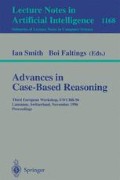Abstract
Since the advent of case-based reasoning (CBR) in the early eighties, two schools seem to have emerged: One that is more concerned with the cognitive aspects of CBR, and another, arguably more applied school, which views CBR as an AI ‘workhorse’, as it were, that can provide solutions to real-world problems. The former school is sometimes associated with the US, and the latter with Europe. This work, to some extent, attempts to reconcile the two camps. It proposes the behaviouristic or cognitive (as opposed to metaphysical) concept notion as conceptual framework for CBR. It does so by reviewing the three most intensely researched concept models, and relating them to the CBR paradigm. Two of the more recently evolved concept views—the probabilistic exemplar and prototype view—are then put forward as epistemologically sound foundation to model a memory of cases. Extending this core model by means of a complementary possibilistic dimension, a rich and flexible case-knowledge representation framework is developed that addresses issues like expressiveness, extendibility, context effects, and uncertainty. This scheme is called PERCEPT.
Preview
Unable to display preview. Download preview PDF.
References
J.L. Kolodner, K.C. Riesbeck. Experience, Memory, and Reasoning. Hillsdale, NJ, 1986.
J.L. Kolodner. Case-Based Reasoning, Morgan Kaufmann Publishers, Inc., CA, 1993.
E.E. Smith, E.J. Shoben, L.J. Rips. Structure and Process in Semantic Memory: A Featural Model for Semantic Decisions. Psychological Review, 81, pp214–241, 1974.
E.E. Smith, D.L. Medin. Categories and Concepts. Harvard University Press, 1981.
R.C. Schank. Dynamic Memory: A Theory of Learning in Computers and People. Cambridge University Press, 1982
J.L. Kolodner. Retrieval and Organizational Strategies in Conceptual Memory. Hillsdale, N.J., 1984.
K.J. Hammond. Case-Based Planning: Viewing Planning as a Memory Task. Academic Press, 1989.
A. Ram A. Indexing, Elaboration and Refinement: Incremental Learning of Explanatory Cases., Machine Learning, 10(3):201–248, 1993.
R. Bareiss, B. Porter, C. Wier. PROTOS—An Exemplar-Eased Learning Apprentice. 2nd Knowledge Acquisition for Knowledge-Based Systems Workshop, 1987.
B. Porter, R. Barreiss, R. Holte. Concept Learning and Heuristic Classification in Weak Theory Domains. Artificial Intelligence, vol. 45 (1–2), pp229–263, 1990.
J.S. Aikins. Prototypical Knowledge for Expert Systems, Artificial Intelligence vol. 20, pp163–210, 1983.
A. Aamodt. A Knowledge-Intensive Approach to Problem Solving and Sustained Learning. PhD dissertation, University of Trondheim, Norwegian Institute of Technology, 1991.
A. Aamodt. Case-Based Reasoning: Foundational Issues, Methodological Variations, and System Approaches. AICOM, vol. 7, 1, 1994.
Y. Cheng. Context-Dependent Similarity. Uncertainty in Artificial Intelligence 6, vol. 12, pp41–47, North-Holland, NY, 1991.
R.E. Stepp, R.S. Michalski. Conceptual Clustering of Structured objects: A Goal-Oriented Approach. Artificial Intelligence, 28, pp43–69, 1986.
A. Tversky. Features of Similarity. Psychological Review, vol. 84, pp327–252, 1977.
Ruspini, E.H., “Possibility as Similarity: The Semantics of Fuzzy Logic”, in Uncertainty in Artificial Intelligence 6, pp271, North-Holland, 1991.
Klir, G.J., T.A. Folger, Fuzzy Sets, Uncertainty and Information, Prentice Hall, Englewood Cliffs, NJ, 1988.
S-J. Chen, C-L. Hwang. Fuzzy Multiple Attribute Decision Making, Methods and Applications, Springer Verlag, 1992.
G.A. Miller. The Magic Number Seven, Plus or Minus Seven. Psychological Review, vol. 6, 3, pp81, 1965.
W. Dubitzky, A. Schuster, J.G. Hughes, D.A. Bell. Conceptual Distance of Numerically Specified Case Features. 2nd New Zealand International Two-Stream Conference on Artificial Neural Networks and Expert Systems, pp210–213, 1995.
A. Schuster, W. Dubitzky, K. Adamson, J.G. Hughes, D.A. Bell. Processing Similarity between a Mix of Crisply and Fuzzily Defined Case Features. submitted to Second International ICSC Symposium on Fuzzy Logic and Applications, 1997.
W. Dubitzky. Uncertainty Management in Case-Based Reasoning: A Concept-Centred Approach, PhD thesis, to be submitted by autumn 1996.
Author information
Authors and Affiliations
Editor information
Rights and permissions
Copyright information
© 1996 Springer-Verlag Berlin Heidelberg
About this paper
Cite this paper
Dubitzky, W., Hughes, J.G., Bell, D.A. (1996). Case memory and the behaviouristic model of concepts and cognition. In: Smith, I., Faltings, B. (eds) Advances in Case-Based Reasoning. EWCBR 1996. Lecture Notes in Computer Science, vol 1168. Springer, Berlin, Heidelberg. https://doi.org/10.1007/BFb0020606
Download citation
DOI: https://doi.org/10.1007/BFb0020606
Published:
Publisher Name: Springer, Berlin, Heidelberg
Print ISBN: 978-3-540-61955-0
Online ISBN: 978-3-540-49568-0
eBook Packages: Springer Book Archive

